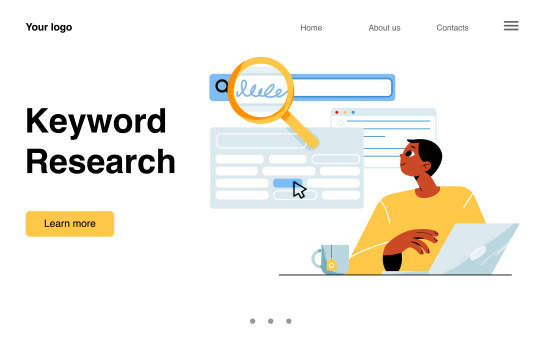#organic search
Explore tagged Tumblr posts
Text
The Relevance of Conducting Keyword Research in Digital Marketing
In a world dominated by technology where businesses require visibility to succeed. The only way to cut through the noise of millions of websites is to know what your audience wants, and then create content that addresses that need. This is where conducting keyword research comes in- it is a critical building block that goes into constructing a good digital marketing strategy.
Understanding Keyword Research :
In most cases, users do not type in full sentences into search engines- instead, they search for keywords and phrases. Keywords are what connect the questions asked by the user, to a piece of content prepared to answer the query. Identifying keywords allows businesses to create content that users are looking for, increasing their chances of ranking higher in search results, and making more sales.

Why Is Keyword Research Important?
A Better Return On Investment (ROI): Returning from targeted ads is higher than any other form or investing in advertising channels, for example: Pay per click adverts.
Increased Visibility: It is extremely hard to get noticed as a new website, and investing in keywords will allow you to boost your website’s organic traffic.
Understanding Audience Intent: Good keyword research helps you understand what your target audience is looking for and how they phrase their queries. You can, therefore, create content that directly answers their needs, thus building trust and fostering engagement.
3. Competitive Advantage: Analyze the keywords your competitors are targeting, find gaps in their strategy, and identify opportunities to differentiate your content. This way, you are ahead in a crowded marketplace.
4. Cost-Efficient Advertising: Keyword research for paid campaigns is very important. For example, Google Ads has to be able to select appropriate cost-effective, high-performing keywords. So, targeting the right keywords really minimizes waste and maximizes ROI.
5. Content Strategy Development: It acts as a roadmap for content strategy. By creating blog posts, videos, and other such assets that actually resonate with the audience while satisfying the search engines, it provides a well-researched list of keywords.
Effective Keyword Research Tips
Use Tools: Utilize Google Keyword Planner, SEMrush, or Ahrefs to uncover the volume, competition, and trend of your keyword.
Long Tail Keywords: Be more specific as they tend to have less competition and more chances of conversion
Search Intent: Identify if it is an information intent, a navigational intent, or transactional intent to use it appropriately for your content.
Keep fresh: trends in searches change, and your keyword approach should be reviewed regularly.
Keyword research is far from a technical task; it's a strategic initiative that bestows business the power to connect with audiences more effectively. The time and resources you invest in understanding the language of your customers set you up for long-term digital marketing success. Whether you are optimizing for organic search or planning a PPC campaign, keyword research is the compass guiding your efforts toward measurable results.
#Digital Marketing#SEO Strategy#Search Engine Optimization#Audience Intent#Content Marketing#PPC Campaigns#Long-Tail Keywords#Marketing Tips#Competitive Analysis#Online Advertising#Marketing Strategy#Website Traffic#Organic Search#Digital Marketing Trends#Keyword research#keyword research tools
2 notes
·
View notes
Text
SEO Dominance: The Key to Online Success
1. Introduction In today’s digital age, having a strong online presence is crucial for businesses of all sizes. The internet has become a vast marketplace, and businesses need to ensure that they are easily discoverable by their target audience. Search Engine Optimization, or SEO, plays a pivotal role in achieving this goal. In this comprehensive article, we will delve deep into the world of…

View On WordPress
#Backlinking#Content Marketing#Digital Marketing#Google Ranking#Keyword Optimization#Link Building#Mobile SEO#Off-Page SEO#On-Page SEO#Online Marketing#Organic Search#Search Engine Optimization#SEO Analytics#SEO Best Practices#SEO Ranking#SEO Strategies#SEO Techniques#SEO Tips#SEO Tools#SEO Trends#SERP (Search Engine Results Page)#User Experience (UX)#Voice Search Optimization.#Website Optimization#Website Traffic
10 notes
·
View notes
Text
5 notes
·
View notes
Text

Potential Factors Influencing (Business or Brand Mentions) in AI Generated Responses:
0 notes
Text
The Essential Guide to Organic Research for Sustainable Growth
Defining Organic Research in Digital Marketing
Organic research represents the systematic approach to gathering market intelligence without paid amplification. This methodology focuses on understanding and improving a brand's natural online presence through:
Analyzing genuine user search patterns and behaviors
Identifying content opportunities that align with audience needs
Developing strategies to enhance visibility without paid promotion
Building lasting authority in search engine rankings
Unlike paid advertising which delivers temporary results, organic research creates sustainable competitive advantages by:
✔ Establishing long-term search visibility ✔ Developing deeper audience understanding ✔ Creating content that continues generating value over time ✔ Building authentic brand authority
This approach forms the foundation for successful SEO, content marketing, and digital growth strategies that withstand algorithm changes and market fluctuations.

The Strategic Value of Organic Research
1. Search Engine Optimization Advantages
Search algorithms increasingly prioritize content that demonstrates:
Strong relevance to user queries
Comprehensive coverage of topics
Natural engagement signals
Authoritative backlink profiles
Organic research identifies the precise factors that influence rankings, enabling businesses to: • Target high-potential keywords • Structure content for maximum visibility • Build sustainable link equity • Avoid algorithm penalties
2. Content Precision and Effectiveness
Thorough organic research ensures content:
Directly addresses audience pain points
Matches current search trends and behaviors
Fills gaps in existing market content
Delivers measurable business impact
This precision leads to: → Higher conversion rates → Improved engagement metrics → Stronger brand positioning → Increased content ROI
3. Competitive Market Positioning
Comprehensive organic research enables brands to:
Identify underserved content niches
Discover competitor weaknesses
Capitalize on emerging trends
Differentiate value propositions
These insights create opportunities to establish market leadership positions that competitors struggle to replicate.
Core Methodologies for Effective Organic Research
1. Comprehensive Keyword Analysis
Advanced keyword research involves:
Identifying primary and secondary keyword targets
Analyzing search volume and difficulty trends
Mapping keyword relationships and hierarchies
Tracking seasonal fluctuations
Monitoring competitor keyword strategies
Best practices include: • Using semantic keyword clustering • Prioritizing question-based queries • Balancing head and long-tail terms • Incorporating local search variations
2. Competitor Benchmarking
Effective competitor analysis examines:
Content depth and quality
Technical SEO implementations
Backlink profile strengths
Engagement rate patterns
Content refresh frequency
This process reveals: → Untapped content opportunities → Technical optimization gaps → Link building prospects → Content upgrade possibilities
3. Search Intent Mapping
Precise intent analysis requires:
Classifying query types (informational, navigational, etc.)
Analyzing SERP features for each intent type
Understanding user journey stages
Identifying content format preferences
Recognizing commercial vs. non-commercial signals
This ensures content: • Matches user expectations • Appears in relevant SERP features • Guides users through conversion funnels • Maximizes engagement potential
4. Content Opportunity Identification
Strategic gap analysis involves:
Comparing competitor content inventories
Identifying unanswered user questions
Recognizing emerging topic trends
Discovering underserved content formats
Spotting outdated industry resources
These insights enable creation of: → Definitive content resources → Evergreen reference materials → Trend-responsive pieces → Comprehensive content hubs
5. Performance Optimization Tracking
Continuous improvement requires monitoring:
Engagement depth metrics
Conversion path analysis
Content decay patterns
SERP feature performance
Ranking fluctuation causes
This data informs: • Content refresh schedules • Structural improvements • Internal linking strategies • Topic expansion opportunities
Implementing an Organic Research Framework
Phase 1: Foundation Building
Conduct comprehensive keyword research
Analyze top competitor strategies
Map search intent landscapes
Identify core content opportunities
Phase 2: Content Development
Create pillar content resources
Develop supporting cluster content
Optimize for featured snippets
Implement structured data markup
Phase 3: Performance Enhancement
Monitor ranking progress
Analyze user behavior signals
Refresh underperforming content
Expand successful content themes
Phase 4: Continuous Optimization
Track industry trends
Update research methodologies
Refine content strategies
Scale successful approaches
The Future of Organic Research
Emerging trends include:
AI-assisted research analysis
Voice search optimization
Predictive search trend modeling
Hyper-personalized content strategies
Visual search optimization
Brands that master organic research will gain: ✔ Sustainable competitive advantages ✔ Higher quality traffic ✔ Stronger customer relationships ✔ Increased marketing efficiency ✔ Long-term business growth
By implementing a disciplined organic research framework, businesses can build digital assets that continue delivering value far into the future, creating marketing channels that compound in effectiveness over time with coding nectar.
#digital marketing strategies#digital marketing#organic search#organic search strategies#SEO#keyword research#keyword
0 notes
Text
#organic search#how to get organic search#increase organic traffic#organic SEO#organic search for business#SEO company in Kolkata#Organic Traffic#Organic reach
0 notes
Text
Many businesses want more people to visit their websites, but they often get stuck choosing between paid ads and organic search. Both options have their own benefits, but which one works best? This blog explains the key differences between the two and how each can help a brand grow online. Readers will discover which method suits their goals, budget, and timeline. It’s a simple, clear guide for anyone looking to make a smart decision.
0 notes
Text
Digital Dominance: How John Simpson’s Team Conquered Google’s First Page
In the fast-paced world of digital marketing, staying ahead of the competition required innovation, strategy, and relentless dedication. John Simpson, the astute manager of DigitalEdge Solutions, a California-based digital marketing company, understood this better than anyone. With an elite team consisting of Jack Smith, a masterful content writer, Jennifer Richardson, an SEO expert, and Emily…

View On WordPress
#content-marketing#digital marketing#first page rank#google search engine#keyword-research#marketing#organic search#secret of success#seo#short story#usa
0 notes
Text
Effective SEO Strategies to Boost Your Online Visibility
Reflecting on my SEO journey, I see how vital a solid SEO plan is. A good SEO strategy can significantly boost your website’s traffic and online presence. By using on-page SEO, like optimizing title tags and meta descriptions, you can climb the search engine rankings. This increases your site’s visibility and chances of showing up on the first page of search results. The world of SEO is always…
#Keyword optimization#Link building#Off-page SEO#On-page SEO#Organic search#SEO techniques#Website Visibility
0 notes
Text
What percent of website traffic comes from organic search
Businesses trying to maximize their online presence in the modern digital terrain must first know where website traffic comes from. Organic search—visitors arriving to a website via unpaid search engine results—is one of the most important factors driving website traffic. But why is it so important? And what proportion of website traffic usually results from organic search? We will explore these issues in this blog and show how "SoftPrudence" can enable you to maximize natural search for your company.

Organic Search Traffic:
Many times, the foundation of a good internet campaign is organic search traffic. It shows guests who, without sponsored advertising, find your website by search engines like Google, Bing, or Yahoo. Here are some main arguments for the need of organic search:
Whether they are looking for information, making a purchase, or scheduling a service, users searching for particular keywords are typically closer to making decisions.
Cost Efficiency: Every hit of organic search does not directly result in a direct money outlay unlike sponsored ads.
Once your website performs well for important terms, it can regularly attract visitors without ongoing expenditure.
High organic ranks frequently reflect authority and trust since visitors click on unpaid results more often than advertising.
Organic search generates how much traffic?
Various studies indicate that organic search usually explains 53% to 60% of website traffic in different sectors. For most websites, this represents the main single traffic source. Still, the precise percentage will depend on things like:
Industry Niche: Organic search is more important in some than others sectors. For content-heavy sectors like education, healthcare, and e-commerce, for instance, percentages are generally greater.
Strategy of Competitors: Should rivals rule search results, a company could find less natural traffic.
Website Improvement: Strong SEO initiatives on a well-optimized site naturally draw more traffic from organic sources.
Though typically behind natural search in terms of volume and quality, other traffic sources include direct visits, social media marketing, and paid ads also contribute.
variables Affecting Natural Search Traffic
Several elements affect the proportion of website visitors derived from natural search. Knowing this will enable companies just like yours maximise their strategy using "Soft Prudence":
Search Engine Optimization (SEO) "Soft Prudence" specializes in developing customized SEO strategies to raise your ranking and exposure; proper keyword targeting, on-page optimization, and back link building greatly increase natural traffic.
Engaging, pertinent, and well-researched material increases user retention and drives clicks. • Made a big difference with blogs, videos, and search intent-oriented infographics.
Search results favor fast-loading, mobile-friendly, easily navigable websites; tools and ideas from "SoftPrudence" can help improve the user experience of your site.
Traffic patterns are affected when search engines regularly change their algorithms; so, staying informed and flexible is essential to keep good natural search performance.
Optimizing Your Organic Search Potential with Gentle Approach
Organic search traffic is not granted; high levels of it depend on constant effort and knowledge. "SoftPrudence" provides a spectrum of services to enable companies rule natural search:
Complete SEO Ex audits:
Point up technical problems, missing keywords, and areas needing development.
The team at SoftPrudence offers thorough reports with practical advice.
Strategies of Targeting Content:
Write material that interacts with people and fits search intent.
Create pillar pages and topic clusters to increase site power.
Make sure your site satisfies Google's Core Web Vitals criteria technically.
For best visibility, optimize meta tags, URLs, and schema markup.
Analytics and Reporting:
Track clicks-through, bounce, and conversion rates among other performance indicators.
Constant improvement of SEO strategy depends on using data-driven insights.
Organic Search's Place in the Marketing Funnel
At every phase of the marketing funnel, organic search traffic is absolutely important:
Awareness: Potential clients find your brand by way of informational searches.
They interact with your website, investigating blogs, product pages, or testimonials.
Conversion: Generally speaking, high-quality organic traffic converts more than other sources.
Understanding the subtleties of every stage, "SoftPrudence" crafts plans to let users move from search results to delighted consumers with ease.
Conclusion
With an average contribution of 53% to 60% organic search still dominates the source of website traffic. It is absolutely vital in promoting sustained, reasonably priced, and high-quality traffic. Businesses will optimize their share of natural search traffic and attain long-term success by concentrating on SEO, content quality, and user experience.
At "SoftPrudence," our area of expertise is releasing the possibilities of natural search for companies in several sectors. Allow us to assist you create a winning plan that raises your ranks, generates traffic, and produces quantifiable outcomes. Get in touch "SoftPrudence" right now to start toward controlling organic search and increasing your internet profile.
0 notes
Text
SEO and SEM Strategies for Ad Agencies: Boosting Online Visibility

In the dynamic world of digital advertising, where the online landscape continually evolves, the significance of SEO (Search Engine Optimization) and SEM (Search Engine Marketing) cannot be overstated. These two pillars play a pivotal role in enhancing the online visibility of ad agencies, ensuring they are not only seen but also stand out in the competitive digital arena.
Understanding SEO and Its Importance
SEO:
Search Engine Optimisation is a comprehensive set of strategies and techniques aimed at optimizing a website's visibility on search engines like Google. It involves various elements, including keyword optimization, content quality, website structure, and backlinking. The ultimate goal is to improve a website's organic (non-paid) search engine rankings, leading to increased visibility and traffic.
Importance of SEO for Digital Ad Agencies:
1. Enhanced Visibility: SEO ensures that when potential clients search for digital ad agencies, the agency's website appears prominently in search results. This visibility is critical for attracting organic traffic and establishing an online presence.
2. Credibility and Trust: Websites ranking high in search results are often perceived as more trustworthy and credible. Effective SEO not only brings an agency to the forefront but also contributes to building trust among users seeking advertising services.
3. Targeted Traffic: By optimizing for relevant keywords, SEO helps attract users actively searching for advertising solutions. This targeted traffic increases the likelihood of converting visitors into potential clients, enhancing the overall effectiveness of the agency's online presence.
Understanding SEM and Its Importance
SEM:
Search Engine Marketing involves paid strategies to increase a website's visibility on search engine results pages (SERPs). This primarily includes paid advertising such as Google Ads, where advertisers bid on keywords to display their ads prominently when users search for those terms.
Importance of SEM for Digital Ad Agencies:
1. Instant Visibility: Unlike SEO, which takes time to build organic rankings, SEM offers instant visibility. Ad agencies can appear at the top of search results immediately after launching a well-optimized SEM campaign, ensuring a quick and targeted reach.
2. Controlled Budget and ROI: SEM allows agencies to set a specific budget for their advertising campaigns. With a pay-per-click (PPC) model, advertisers only pay when users click on their ads. This cost-effective approach provides control over spending and allows for a measurable return on investment (ROI).
3. Precise Targeting: SEM platforms provide advanced targeting options, allowing agencies to reach specific demographics, locations, or user segments. This precision ensures that ads are displayed to the most relevant audience, increasing the likelihood of conversions.
Crafting Effective SEO Strategies for Digital Ad Agencies and Online marketing agencies
1. Keyword Optimization: Identify and target relevant keywords related to digital advertising.
2. Quality Content Creation: Develop high-quality, engaging content that showcases the agency's expertise, services, and industry insights. Regularly update the website with fresh content to signal relevance to search engines.
3. User-Friendly Website Design: Ensure a responsive and user-friendly website design. A well-structured site with intuitive navigation enhances user experience, contributing to improved SEO performance.
4. Backlink Building: Cultivate high-quality backlinks from reputable sources within the advertising industry. Quality backlinks signal authority to search engines, positively impacting rankings.
5. Local SEO Optimization: For agencies targeting local clients, optimize for local search by creating a Google My Business profile, acquiring local reviews, and including location-specific keywords.
Implementing Strategic SEM Campaigns for Digital Ad Agencies
1. Keyword Research and Selection: Conduct thorough keyword research to identify relevant terms for targeting in SEM campaigns. Select a mix of branded and industry-specific keywords.
2. Compelling Ad Copy: Craft compelling and relevant ad copy that highlights the agency's unique selling points. A well-written ad copy increases the chances of user engagement and click-throughs.
3. Landing Page Optimization: Ensure that the landing pages linked to SEM ads are optimized for conversions. A clear call-to-action, relevant content, and a user-friendly layout contribute to a positive user experience.
4. Ad Testing and Optimization: Continuously test different ad variations to identify the most effective messaging, visuals, and calls to action. Regularly optimize campaigns based on performance data to maximize ROI.
5. Utilizing Ad Extensions: Take advantage of ad extensions provided by platforms like Google Ads. Extensions can include additional information such as site links, contact information, and location details, enhancing the ad's visibility and relevance.
Measuring Success and Continuous Improvement
To gauge the success of SEO and SEM efforts, ad agencies must utilize analytics tools. Monitoring key metrics such as organic traffic, keyword rankings, click-through rates, and conversion rates provides valuable insights. Regular performance assessments allow agencies to identify areas for improvement and refine their strategies for ongoing success.
In conclusion, as digital advertising landscapes continue to evolve at a rapid pace, the symbiotic integration of SEO and SEM emerges as a cornerstone for the success of digital ad agencies. The importance of these strategies lies not only in achieving visibility but in navigating the nuanced dynamics of the online realm. SEO, with its organic approach, facilitates a gradual yet enduring ascent in search engine rankings, fostering credibility, trust, and targeted traffic for ad agencies. The meticulous optimization of keywords, creation of high-quality content, and user-friendly website designs collectively contribute to an authoritative online presence that resonates with both search engines and potential clients.
Simultaneously, SEM injects immediacy and precision into the equation, ensuring ad agencies can swiftly capture attention in the competitive digital landscape. The pay-per-click model, central to SEM, allows agencies to maintain a controlled budget while reaping the benefits of instant visibility. With SEM, agencies can strategically position themselves at the forefront of search results, targeting specific demographics, locations, or user segments with unprecedented accuracy. This level of targeted exposure, combined with compelling ad copy and effective landing page optimization, provides ad agencies with a dynamic toolset to convert user engagement into tangible business outcomes.
Crafting effective SEO and SEM strategies involves not only understanding the intricacies of search engine algorithms but also staying attuned to the specific needs and behaviors of the target audience. Keyword optimization, content creation, and website design must align seamlessly with the agency's brand identity, showcasing expertise, innovation, and relevance in the ever-evolving digital advertising landscape. It is a continuous process that demands adaptability, analytics-driven insights, and a commitment to improvement.
As agencies delve into the implementation of these strategies, the metrics provided by analytics tools become essential compasses guiding the way. Monitoring organic traffic, keyword rankings, click-through rates, and conversion rates offers agencies real-time insights into the effectiveness of their efforts. Regular evaluations not only enable agencies to measure success but also empower them to refine their strategies, adapting to changes in search engine algorithms, emerging industry trends, and the evolving needs of their target audience.
In essence, the synergy between SEO and SEM transforms the digital advertising landscape from a challenging frontier into a realm of opportunity. Digital ad agencies that embrace these strategies not only secure their visibility amidst the vast online expanse but also unlock the potential for sustained growth and client acquisition. The journey involves more than just climbing search engine rankings; it is about creating a digital footprint that resonates with authenticity, relevance, and innovation.
In the ever-expanding world of digital advertising, where every click and impression matters, the strategic fusion of SEO and SEM propels ad agencies beyond mere visibility – it establishes a compelling and influential presence that captivates audiences, converts prospects into clients, and positions the agency as a leader in the competitive digital landscape. The roadmap to success lies in the artful balance of organic growth and targeted immediacy, where agencies not only navigate the digital frontier but also shape it with their unique identity, expertise, and commitment to delivering exceptional results.
This post was originally published on: Apppl Combine
#SEO#SEM#digital ad agencies#online visibility#keyword optimization#content creation#search engine marketing#search engine optimization#digital advertising strategies#PPC#ad campaigns#website design#organic search#paid search#Apppl Combine#digital marketing agency
0 notes
Text
Paid Ads vs. Organic Traffic – Which is Better for You?
“The best marketing doesn’t feel like marketing.” – Tom Fishburne
Today, digital marketing is constantly evolving and every company is vying for a chance to grab the coveted ‘numero uno’ ranking in Google. For this, companies often look for ways to improve their search visibility and drive more traffic to their website.
Two leading methods that drive traffic to a site include Google paid search and organic traffic. Each has its share of advantages and drawbacks.
But which approach is better for your business?
Let us discuss the basics of both these strategies and how they can be used to shape the success of your digital campaigns.
Understanding Paid Ads and Organic Traffic
What are Paid Ads?
Paid ads, or paid search or paid advertising, are a form of digital marketing where businesses pay to display their ads on search engine results pages (SERPs) or other platforms. Google paid ads, for example, appear at the top of search results with a small “Ad” label.
Paid search marketing, or pay-per-click (PPC) advertising, is like putting up a billboard on the internet highway. Here’s how it works:
You create an ad for your business.
You choose specific words or phrases (keywords) that relate to your ad.
When someone searches for those keywords, your ad pops up.
If they click on your ad, you pay a small fee. Hence the term ‘pay-per-click’
Google Ads is the big player in this game. Google paid search works like an auction where businesses bid to have their ads shown. But it’s not just about who bids the highest.
Google also looks at:
How relevant your ad is to what people are searching for?
How often people click on your ad (click-through rate)?
How good the webpage is that your ad leads to (landing page quality)?
What is Organic Traffic?
Organic traffic, on the other hand, refers to visitors who land on your website through unpaid search results. This type of traffic is generated through search engine optimization (SEO) efforts, which aim to improve your website’s visibility in organic search results. Organic search is all about making your website naturally appealing to search engines like Google.
Here’s how organic search usually works:
You create great content on your website.
You ensure your website is easy to use and works well on mobile devices.
You build relationships with other websites to get them to link back to you.
Over time, search engines start to see your website as valuable and show it higher in search results.
Google’s algorithm for organic search is like a picky food critic. It considers many factors to decide which websites to show first, including:
The quality and relevance of your content.
How other websites link to you (backlinks).
How easy your website is to use?
How well your website works on smartphones and tablets?
Both paid search and organic traffic are important for a well-rounded online marketing strategy. Paid ads can give you quick visibility, while organic search builds long-term credibility.
Benefits of Paid Ads
1. Immediate Results
One of the most significant advantages of paid search marketing is the speed at which you can see results. As soon as your campaign goes live, your ads will start appearing in front of potential customers.
2. Targeted Reach
Google paid search allows you to target specific keywords, demographics, and locations, ensuring your ads reach the right audience at the right time.
3. Measurable Performance
Paid advertising platforms provide detailed analytics, allowing you to track your campaign’s performance and make data-driven decisions to optimize your ROI.
Benefits of Organic Traffic
1. Long-term Sustainability
While it takes time to build, organic search traffic can provide a steady stream of visitors to your website over the long term.
2. Cost-effectiveness
Once you’ve established strong SEO organic results, you will continue to attract traffic without ongoing ad spend.
3. Increased Credibility
Users often trust organic search results more than paid ads, which can lead to higher click-through rates and conversions.
Which Approach is Right for You?
The choice between paid ads and organic traffic isn’t always an either/or decision. Many successful businesses use a combination of both strategies to maximize their online presence.
Consider Paid Ads If:
You need immediate results.
You’re launching a new product or service.
You want to target specific demographics or locations.
You have the budget for ongoing ad spend.
Focus on Organic Traffic If:
You’re looking for long-term, sustainable growth.
You want to establish your brand as an industry authority.
You have a limited budget for advertising.
You’re willing to invest time in content creation and SEO.
Should businesses focus on organic search, paid search, or both?
Most businesses benefit from integrating both organic and paid search into their digital marketing strategies. For example, if you’re looking to promote a new service, paid search can quickly generate visibility and attract immediate interest. Meanwhile, organic search is ideal for boosting visibility for an existing product with steady but lower demand. Choosing between paid search and organic search depends on a business’s specific goals and budget. Paid search offers quick results and precise targeting, making it ideal for businesses with time-sensitive promotions or a larger budget. In contrast, organic search is a cost-effective, long-term strategy that helps improve visibility over time.
To determine which channel to use, start by defining your specific goals. Once you have a clear objective, choose the search method that aligns best with your goals. For example, a campaign to introduce a new service might include both a paid ad for instant visibility and an optimized service page to build long-term organic traffic.
However, as a digital marketer, you should also understand this:
A balanced digital marketing approach often combines both paid and organic search tactics. Organic search allows you to leverage the power of content marketing effectively. While content marketing supports paid search efforts by providing a destination for users who click on ads, its real strength lies in enhancing search engine optimization (SEO). Content created for SEO is often informational and educational, which resonates well with users.
Research shows that 70% of users prefer learning about companies through articles rather than ads. Additionally, 61% of users express a stronger preference for businesses that produce original content.
By focusing on organic search with a strong SEO strategy, your business can enjoy several advantages. You can expand your visibility in search results, create valuable content for your audience, and drive future actions like purchases, store visits, and quote requests.
Our Two Cents
In summary, a successful digital marketing strategy integrates both paid and organic search tactics while focusing on user experience and staying informed of industry trends. This approach helps businesses reach their target audience effectively, achieve higher returns on investment, and maintain a competitive edge in the market.
Want to create digital marketing campaigns that impact the right metrics and generate more ROI for your business?
Enter Gyaata Solutions!
Who Are We?
At Gyaata, we’re more than just a digital marketing agency – we’re your dedicated partners in growth. With a team of certified experts and a personalized approach, we create customized, data-driven strategies that elevate your brand’s online presence and deliver measurable results. From branding and content creation to inbound and outbound marketing, we offer a full spectrum of services designed to boost visibility, drive conversions, and increase revenue.
So, contact us today to let us know your needs and offer you a custom-made marketing strategy.
0 notes
Text

Key Benefits of SEO for Businesses:
#search engine optimization#seo#organic search#SEO Benefits#direct marketing#seo and online marketing#website optimization
0 notes
Text
0 notes
Text


2004-06-18
#cat#Xbox#grumbling because I found this organically and when I reverse searched it someone posted it on tumblr only a year ago#as part of a larger photoset but still#feel like such a poser whe#top one is new tho
5K notes
·
View notes
Text
How to Effectively Merge PPC and SEO Without Overspending?

I never thought I'd crack the code of online marketing. My small business was struggling, lost in the vast digital landscape.
Then it hit me - why not combine PPC and SEO?
Day one, I started researching. Google Ads became my new best friend.
I crafted compelling ad copy, targeting keywords like "affordable local services" and "best [my industry] near me". Simultaneously, I optimized my website for these same phrases.
The results? Shocking. Within a week, my click-through rate jumped by 35%. But here's the kicker - my organic traffic also surged by 20%. The synergy was real.
I dug deeper. Analyzing my PPC data, I discovered long-tail keywords I'd never considered. "24/7 emergency [my service] in [my city]" became a goldmine. I incorporated these into my content strategy, creating blog posts and landing pages.
Suddenly, I was ranking for terms I'd never dreamed of.
My bounce rate plummeted from 65% to 40%. People were finding exactly what they needed.
But it wasn't all smooth sailing. My ad spend initially skyrocketed. Panic set in. Was I hemorrhaging money?
That's when I had my eureka moment.
I used my SEO insights to refine my PPC strategy.
By focusing on high-converting organic keywords, I slashed my cost-per-click by 25%.
Now, my website is a powerhouse. Organic traffic feeds my remarketing campaigns. PPC data informs my content creation. It's a beautiful, cost-effective cycle.
The result? My online visibility has doubled. Sales are up 50% year-over-year. And the best part? My marketing budget hasn't increased a dime.
What strategies have you used to integrate PPC and SEO? Share your experiences in the comments!
Get Tips, Suggestions, & Workarounds, in 2-3 mins, on How to Effectively Merge PPC and SEO Without Overspending?
#ppc#seo#digital marketing#online visibility#keyword research#ad copy#content strategy#remarketing#cost-per-click#organic traffic#conversion rate#landing pages#google ads#long-tail keywords#marketing budget#website optimization#click-through rate#bounce rate#search engine rankings#paid advertising#organic search#target audience#ROI#analytics#competitive advantage#marketing ROI#brand awareness#customer acquisition#lead generation#SubhamDas
0 notes